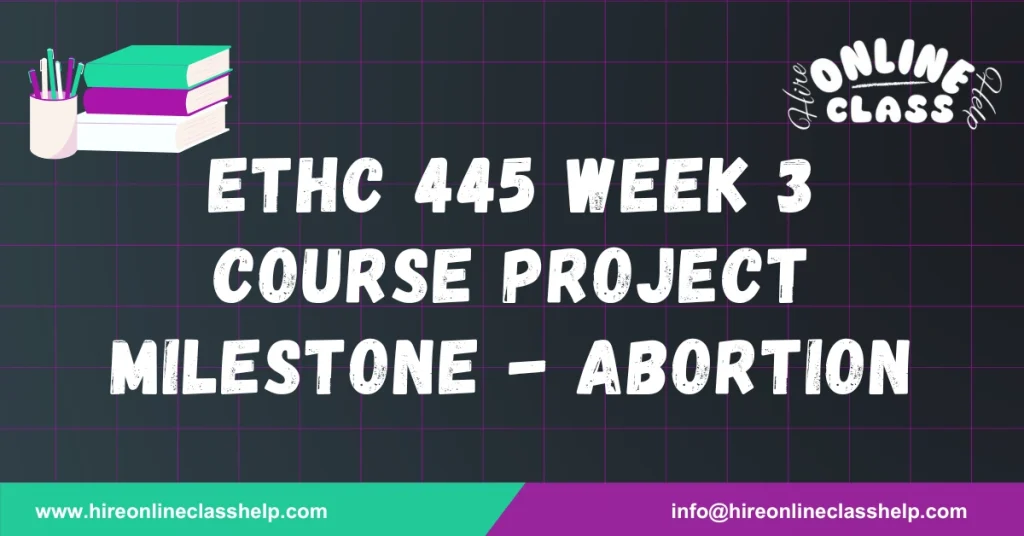






Name
Chamberlain University
ETHC-445 Principles of Ethics
Prof. Name
Date
The moral controversy under discussion is that of abortion. The focus will be on the perspectives of two philosophical viewpoints: ethical egoism and social contract ethics. This discussion aims to present these viewpoints impartially, while also considering the ethical dilemmas raised by abortion in modern society. As medical technology progresses, so do medical procedures that help individuals manage illnesses, including abortion—a process used to terminate pregnancies. Abortions may be carried out surgically or through medication (Gugliotta, 1996). Despite medical advances, the morality of abortion remains a contentious issue. With approximately half a million abortions occurring annually in the United States (Rachels, 2018), the debate over the ethics of abortion persists. Pro-life advocates often frame abortion as “murder,” arguing that it denies an unborn child the chance at life (Rachels, 2018). Meanwhile, those who support pro-choice perspectives emphasize the individual’s right to make decisions about their own body (Rachels, 2018).
Ethical egoism centers on the principle of self-interest. According to Rachels (2018), ethical egoists believe that the fundamental principle guiding human behavior is the pursuit of one’s own best interests. This view suggests that decisions, including the decision to have an abortion, are morally justified if they serve the individual’s self-interest. In the context of abortion, an ethical egoist would likely support a woman’s decision to terminate a pregnancy if she believes it aligns with her own needs or desires, regardless of moral arguments that frame abortion as “murder.” The principle of self-interest supports the individual’s autonomy, even if this autonomy conflicts with the broader societal belief in protecting unborn life.
Common sense, as discussed by Rachels (2018), offers an additional layer of complexity to the ethical egoist’s stance. Common sense emphasizes the importance of truth, keeping promises, and not causing harm to others. Pro-life advocates argue that abortion violates the principle of “do no harm” because it terminates a life. However, an ethical egoist might counter that the decision to avoid harm to oneself, such as financial instability or an inability to care for a child, justifies the act of abortion.
In contrast to ethical egoism, social contract ethics focuses on collective agreement and societal rules. According to Rachels (2018), a social contract ethicist believes that moral rules are valid when rational individuals agree to them for the sake of maintaining social order. In the context of abortion, this perspective can lead to varying conclusions. A social contract ethicist may support abortion if society deems it necessary for controlling overpopulation or protecting the health and well-being of individuals. On the other hand, in a society facing depopulation, a social contract ethicist might oppose abortion as a threat to societal survival.
McLean et al. (2019) highlight another ethical dilemma—maternal death during abortion. This dilemma creates tension between personal obligations and societal norms. For instance, a mother who is unable to financially care for a fourth child may feel personally justified in seeking an abortion. However, the risk of maternal death complicates the moral decision, as the potential harm to the mother could outweigh her financial concerns. A social contract ethicist would argue that in such cases, the moral obligation to protect the life of the mother and her existing children should take precedence over societal norms surrounding abortion.
The ethical debates surrounding abortion also extend to healthcare professionals. The American Nurses Association’s Code of Ethics emphasizes patient care as the top priority, regardless of personal beliefs (Zahedi et al., 2013). This code suggests that if a pregnancy threatens a patient’s life, abortion may be morally justified to save the mother, even if it means sacrificing the unborn child. Such a decision aligns with the ethical principle of prioritizing patient health and well-being over personal or societal beliefs.
Denis, L. (2007). Abortion and Kant’s Formula of Universal Law. Canadian Journal of Philosophy, 37(4), 547–579.
Gugliotta. (1996). Ethical dilemma of medical abortion. Canadian Medical Association Journal (CMAJ), 155(1), 18–19.
Kain, P. (2009). Kant’s Defense of Human Moral Status. Journal of the History of Philosophy, 47(1), 59–101. https://doi.org/10.1353/hph.0.0083
McLean, Desalegn, D. N., Blystad, A., & Miljeteig, I. (2019). When the law makes doors slightly open: Ethical dilemmas among abortion service providers in Addis Ababa, Ethiopia. BMC Medical Ethics, 20(1), 60–60. https://doi.org/10.1186/s12910-019-0396-4
Rachels, J. (2018). The Elements of Moral Philosophy (9th ed.). McGraw-Hill Higher Education (US).
Zahedi, F., Sanjari, M., Aala, M., Peymani, M., Aramesh, K., Parsapour, A., Maddah, S. S. B., Cheraghi, M. A., Mirzabeigi, G. H., Larijani, B., & Dastgerdi, M. V. (2013). The Code of Ethics for Nurses. Iran J Public Health.